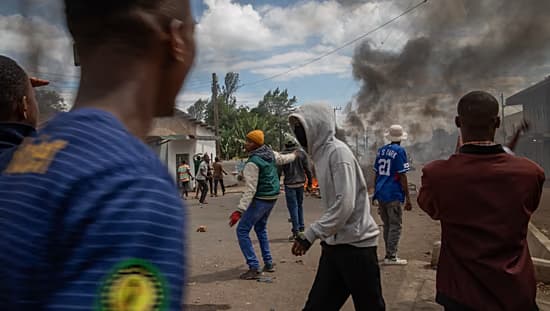We're loading the full news article for you. This includes the article content, images, author information, and related articles.
The disappearance of Fredrick-Lorent Obuya after his arrest in Dar es Salaam raises urgent questions about the safety of Kenyans in Tanzania, as another national is confirmed killed in the violent aftermath of the disputed October 29 general election.

A 29-year-old Kenyan lawyer and entrepreneur, Fredrick-Lorent Obuya, has been missing for five days in Tanzania following his arrest by police in Dar es Salaam on Friday, October 31, 2025, EAT. His disappearance occurs amidst a brutal crackdown on dissent by Tanzanian authorities following the nation's highly contentious general election held on Wednesday, October 29, 2025. The incident, coupled with the killing of another Kenyan citizen during the unrest, has ignited serious concerns over the safety of Kenyans in the neighbouring country and is placing a significant strain on diplomatic relations within the East African Community.
According to the human rights organization VOCAL Africa, Mr. Obuya, who runs a tour company, was on a business trip to Zanzibar when he was detained by plain-clothes officers. His last known location was the Oyster Bay Police Station in Dar es Salaam, but official channels have since fallen silent on his whereabouts. In a statement released on Wednesday, November 5, 2025, VOCAL Africa CEO Hussein Khalid confirmed the organization had taken up the case and was demanding answers. Family and friends report that all contact with Mr. Obuya was lost shortly after his arrest. As of Wednesday evening, neither the Tanzanian police nor the Kenyan High Commission in Dar es Salaam had issued a formal statement on the matter, deepening the anguish for his family and fueling fears for his safety.
Mr. Obuya's disappearance is not an isolated event but part of a wider, violent fallout from an election that international observers have criticized as falling short of democratic standards. Incumbent President Samia Suluhu Hassan was declared the winner with an improbable 97.66% of the vote after her main challengers were jailed or barred from contesting. The announcement on Saturday, November 1, 2025, by the Independent National Electoral Commission (INEC) triggered widespread protests across major cities.
Human rights organizations, including Human Rights Watch and Amnesty International, have condemned the lethal force used by Tanzanian security forces against protesters. Reports indicate that police have used tear gas and live ammunition to disperse crowds, leading to a significant number of fatalities and injuries. While the government has largely remained silent on casualty numbers, opposition parties allege that hundreds have been killed. In her inaugural address on Monday, November 3, 2025, President Hassan acknowledged some loss of life but blamed the unrest on foreign instigators, a claim that has intensified concerns for foreign nationals in the country.
The climate of fear has been exacerbated by a nationwide internet shutdown imposed on election day, which has only recently been partially lifted, making it difficult to verify information and document abuses.
The danger to Kenyans was starkly illustrated by the death of John Okoth Ogutu, a 33-year-old teacher who had worked at Sky Schools in Dar es Salaam for nearly a decade. Mr. Ogutu was reportedly shot and killed in the Ubungo district on election day, October 29. His family in Nairobi is now facing further distress, as human rights groups report his body, which was initially taken to the Mwananyamala Hospital morgue, has since gone missing.
These incidents have prompted urgent calls for action from Kenyan leaders. On Wednesday, November 5, 2025, Embakasi East Member of Parliament Babu Owino wrote to Kenya's Prime Cabinet Secretary and Cabinet Secretary for Foreign and Diaspora Affairs, Musalia Mudavadi, demanding a transparent investigation into Mr. Ogutu's death and government intervention to locate Mr. Obuya. In his letter, Mr. Owino highlighted the threat to the East African Community's protocols on free movement and called for a parliamentary statement on measures to protect Kenyans abroad.
VOCAL Africa has urged the Kenyan government to engage Tanzanian authorities to ensure Mr. Obuya is treated in accordance with international law and to assist the Ogutu family in locating their son's remains for repatriation. The unfolding crisis serves as a critical test for regional diplomacy and the protection of citizens' rights across East Africa. With official communication from Tanzanian authorities still pending, the fate of Fredrick-Lorent Obuya hangs in the balance, a symbol of the deep-seated political crisis currently engulfing the nation. FURTHER INVESTIGATION REQUIRED.
Keep the conversation in one place—threads here stay linked to the story and in the forums.
Other hot threads
E-sports and Gaming Community in Kenya
Active 8 months ago
The Role of Technology in Modern Agriculture (AgriTech)
Active 8 months ago
Popular Recreational Activities Across Counties
Active 8 months ago
Investing in Youth Sports Development Programs
Active 8 months ago
Key figures and persons of interest featured in this article